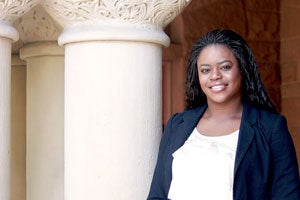It was the first real case Nneka Ukpai ’11 had ever tried. But by the second day of trial, her skillful advocacy created such a buzz in the Suffolk County courthouse last spring that the courtroom was packed with fellow HLS students, prosecutors, defense lawyers, even judges.
After the jury found her client not guilty on three counts including assault and battery on a police officer, the presiding judge called Ukpai back into chambers and told her it was the best performance she’d ever seen by a student lawyer, according to Ukpai and her supervising attorney, HLS Clinical Instructor Dehlia Umunna. And a lawyer visiting from Washington, D.C., was so taken by Ukpai’s talent that she wrote about her in a blog, noting that Ukpai “knew the case cold,” rarely looked at her notes, and presented a closing argument that was both “composed and compassionate.”
The acquittal was especially impressive because three police officers testified against Ukpai’s client, a high school student who claimed she assaulted no one and was rather trying to help break up a fight. “For them to have acquitted her, I know it’s because they could see how much I believed in the case and how much I believed in my client,” says Ukpai, who took the case as a student in HLS’ Criminal Justice Institute, where 3L students represent criminal defendants in real cases under the supervision of expert lawyers. The client told Ukpai after the trial that she knew her lawyer believed her, and that meant more to her than the not guilty verdict.
Truth told, Ukpai had been practicing for that result since she attended a pre-law middle school, then a pre-law high school in Coral Springs, Fla. “I’ve been doing competitive mock trials since sixth grade,” says Ukpai, who worked in the Ft. Lauderdale public defenders’ office after high school. “I’ve argued cases – albeit mock trials – before federal judges, and gotten every aspect of my performances critiques. So the same trial techniques I used during competition, I used in this trial.”
For instance, when the prosecution’s key witness, the officer who claimed Ukpai’s client assaulted him, side-stepped a question she posed during cross-examination, she was ready. “I think that would fluster a lot of students,” Ukpai notes. “I could simply say, ‘Thank you for that, but to direct you back to my question …’ I think the judge was most impressed by how calm and level-headed I remained, and how I was able to pick up on some nuanced and some blatant inconsistencies in the officer’s testimony and exploit them to the fullest in my closing argument.”
Ukpai, who majored in legal communication and political science with concentration in race and public policy at Howard University, chose HLS because of its clinical programs, especially CJI. “Harvard has more clinical programs, a world -renowned faculty, everything you need to be the best you can be,” she says. As a 1L, she joined Harvard Defenders, representing low-income clients in show-cause hearings before clerk-magistrates in Boston area courts. In CJI, she and other students – whom Umunna says Ukpai was always eager to help — engaged in every stage of client representation from arraignment through trial, including client interviewing, factual and legal investigation, motions practice, developing case theories, and preparing and conducting witness examinations and argument.
“CJI is the highlight of my Harvard Law School career,” Ukpai says. “We serve a client base that is the most in need of zealous representation, and the level of supervision I received from my supervisor was unparalleled. Dehlia pushed me and pushed me even further, to search within myself and be introspective and figure out how I could be even better for my client.”
Even among a group of dedicated CJI students, Ukpai’s gifts immediately stood out, says Umunna. In the seminar component of the CJI-related course, Introduction to Trial Advocacy, Ukpai earned the highest grade in the class and received the Harvard Dean’s Scholar Award. In recognition of her student advocacy, Ukpai received a 2011 CLEA Outstanding Student Award from the national Clinical Legal Education Association.
“She advocated for all of her clients as if her own liberty depends on the outcome,” Umunna says, adding that Ukpai developed a reputation among prosecutors as a formidable opponent. “In preparing her cases for trial she spent countless hours in the field canvassing neighborhoods, taking pictures and videos, and speaking to potential witnesses. No task was ever too small.”
Ukpai, who interned last summer in the trial division of the Public Defender Service of D.C., has now returned to that city and is deciding among several public service jobs. She always wanted to be a lawyer. “I bought my first Black’s Law Dictionary in sixth grade, and I still have it,” she says. “My name is written in all caps, in big letters.”
